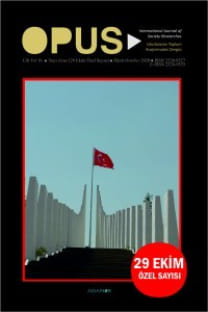"Kosova ABD'nin 51. Eyaleti" Söyleminin Medeniyetler Çatışması ve (Neo)Realizm Özelinde Karşılaştırmalı Tahlili
Kosova, ABD, Uluslararası İşbirliği, Medeniyetler Çatışması, (Neo) Realizm
A Comparative Analyze of "Kosovo Is The 51. State Of The USA" Discourse in the Frame of Clash of Civilizations Thesis and (Neo) Realism
Kosovo, USA, International Cooperation, (Neo) Realism, Clash of Civilizations,
___
- Allen, S. (2012). 8. U.S presidents with statue abroad. The Week, 14 Mayıs 2017 tarihinde http://theweek.com/articles/470276/8-presidentsstatues-abroad adresinden erişildi
- Bieber F. ve Daskalovski Z. (2003). Understanding the war in Kosovo. London: Frank Cass Publishers
- Binns, J. (2003). An introduction to the Christian Orthodox churches. Cambridge: Cambridge University Press
- Cankara P. ve Cankara Y. (2007). Vladimir Putin döneminde Rus dış politikasında yapılan değişiklikler. SDÜ Fen Edebiyat Fakültesi Sosyal Bilimler Dergisi, 15, 206-xxx.
- Çalış, Ş. ve Özlük, E. (2007). Uluslararası ilişkiler tarihinin yapısökümü: idealizm realizm tartışması, SÜ Sosyal Bilimler Enstitüsü Dergisi, 18, 233-xxx
- Çaman, E. (2007). Uluslararası ilişkilerde neo(realist) paradigmanın Almanya’daki gelişimi ve evrimi: Kindermann ve Münih Okulu. Uluslararası Hukuk ve Politika, 2, 38-xxx
- Coşkun, B.D. (2010). Kosova’nın bağımsızlığı ve Türk dış politikası. Uluslararası İlişkiler Dergisi, 27, 67-xxx
- Donnelly, J. (2013). Realizm. (Ali Aslan ve Muhammed Ali Ağcan Çev.) S.Burchill (Der.) Uluslararası ilişkiler içinde (s.57). İstanbul: Küre Glaser, C.L. (1994). Realists as optimists. International Security, 19, 50-xxx
- Global Investment Center. (2016). Kosovo country study guide (International Business Publications No.1 Strategic Information and Development). Washington, D.C: International Business Publications
- Haxhijaj, A. (2016). Kosovo celebrates U.S indepence day. BalkanInsight, 14 Mayıs 2017 tarihinde http://www.balkaninsight.com/en/article/kosovo-celebrates-america-s-independence-day-07-04-2016 adresinden erişildi
- Hellmann, G. ve Wolf, R. (1993). Neorealism neoliberal institutionalism and the future of NATO. Security Studies, 3, 8-xxx
- Huntington, S. (1993). The clash of civilizations?.Foreign Affairs, Summer 1993, 22-xxx
- Judah, T. (2008). Kosovo: what everyone needs to know. New York: Oxford University Press
- Malmvig, H. (2006). State, sovereignty and intervention: a discourse analyses of interventionary and non-interventionary practices in Algeria and Kosovo. New York: Routledge
- O’Donnel, C. (2014). The development of the responsibility to protect: an examination of the debate over the legality of humanitarian intervention. Duke Journal of Comparative&International Law, 24, 564-xxx
- Pollack, J. (2002). Saudi Arabia and the United States 1931-2002. Middle East Review of International Relations, 6, 77-xxx
- Serdar, İ. (2015). Neorealizm, neoliberalizm, konstraktivizm ve İngiliz okulu modellerinde uluslararası sistemsel değişikliklere bakış. The Journal of Europe-Middle East Social Science Studies, 1, 18-xxx
- Shaw, D. (1994). The status of Puerto Rica revisited: does the current USPuerto Rico relationship uphold international law?.Fordham International Law Journal, 17, 1006-xxx
- Sotiroviç, V.B. (2013). National identity: who are the Albanians? the Illyrian anthroponym and the ethnogenesis of the Albanians. History Research, 1, 6-xxx
- Glenny, M. (1996). The fall of Yugoslavia. London: Penguin Books Oğultürk, M.C. (2014). Kosova'nın bağımsızlık süreci kapsamında ABD dış politikasının analizi. Security Strategies, 19, 121-xxx
- Ülger, İ.K. (2003). Yugoslavya neden parçalandı? Balkan dramının perde arkası. Ankara: Seçkin
- Yılmaz, M.E. (2009). Soğuk Savaş sonrasında yeni dünya düzeni. Akademik Bakış, 17, 2-xxx
- Zifcak, S. (2012). The responsibility to protect after Libya and Syria. Melbourne Journal of International Law, 13, 1-xx
- Walt, S.M. (2011). The myth of American exceptionalism. Foreign Policy, 14 Mayıs 2017 tarihinde http://foreignpolicy.com/2011/10/11/themyth-of-american-exceptionalism/ adresinden erişildi.
- https://www.cia.gov/library/publications/the-world-factbook/geos/kv. html, Erişim Tarihi: 09.05.2017.
- https://www.bloomberg.com/politics/articles/2016-12-12/russia-s-lavrovvisits-serbia-as-concern-rises-in-eu-and-nato, Erişim Tarihi: 13.05.2017.
- http://www.hurriyet.com.tr/uzaydan-gorunen-us-8600959, Erişim Tarihi: 13.05.2017.
- http://www.chicagonow.com/talking-world/2016/03/kosovo-a-troublinghistory-gives-way-to-independence-and-a-new-identity/, Erişim Tarihi: 16.11.2017
- http://www.bbc.com/turkce/40247544, Erişim Tarihi 16.11.2017
- ISSN: 2528-9527
- Yayın Aralığı: Aylık
- Yayıncı: ADAMOR Toplum Araştırmaları Merkezi
Özel Yetenekli Öğrencilerin Liderlik Becerilerinin
Öğretmenlerin Lisansüstü Eğitim Yapmama Nedenlerinin İncelenmesi
Evaluating Turkish TV Series as Soft Power Instruments
Pedagojik Formasyon Öğrencilerinin Yansıtıcı Düşünme Düzeyi Algıları ve Öğretimsel Karar Süreçleri
Kevser BAYKARA ÖZAYDINLIK, Mukaddes ERDEM
Bir Zihniyet Tutumu ve Düşünme Formu Olarak Dogmatizm ve Dogmatik Tutum
Suriyeliler ve Vatandaşlık: Yerel Halk ve Suriyeli Sığınmacılar Çerçevesinde Bir Değerlendirme
Öğretmenler ve Okul Müdürleri Perspektifinden Okul Hesap Verebilirliği Politikaları
Halk Eğitim Merkezlerinde Çalışan İşgörenlerin Yaşam Boyu Öğrenme Anahtar Yeterlik Algıları
An Investigation of The Relationship Between Childhood Trauma Experience of Adolescents and
